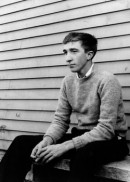 Last week, the New Yorker’s Book Bench published an interview with John Updike that had not previously appeared in English. It originally ran in a Croatian literary magazine in 1979. It covers Updike’s writing process, the temperament of American writers, and international literature. It’s also crammed with his opinions about many prominent figures. A (small) sampling below:
Last week, the New Yorker’s Book Bench published an interview with John Updike that had not previously appeared in English. It originally ran in a Croatian literary magazine in 1979. It covers Updike’s writing process, the temperament of American writers, and international literature. It’s also crammed with his opinions about many prominent figures. A (small) sampling below:
Donald Barthelme: “[L]ike Hemingway, he’s a great simplifier or stripper away of verbal nonsense. After reading enough Barthelme, your own stories tend to become a little shorter and cleaner and more spasmodic.”
Thomas Pynchon: “I really find it not easy to read him; I don’t like the funny names and I don’t like the leaden feeling of the cosmos that he sets for us. I believe that life is frightening and tragic, but I think that it is other things, too.”
Alfred Kazin: “I think Kazin as a critic does suffer a little bit from an imperial manner. The American critic on the whole feels obliged not merely to respond to the work set before him, but to somehow become a prophet, a pronouncer on American society.”
William Faulkner: “I find that Faulkner, even in his best novels, just goes on too long and has something kind of uncontrolled.”
Iris Murdoch and Muriel Spark: “constantly do things that no American writer could do.”
And my favorite:
Moby-Dick: “The wish to say all there is about whales is certainly very much there, and one puts the book down convinced that Melville has said a great deal about whales.”

